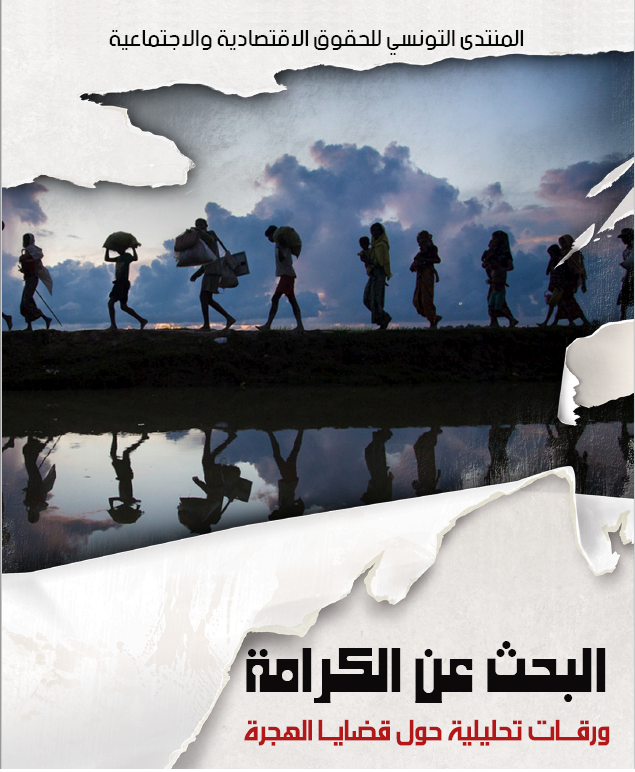In Search of Dignity
The Situation of Migrants, Refugees and Asylum Seekers in the Region of Medenine
Naima FEKIH
Abstract: Marie schneider
Introduction
Since the revolution of 2011, the Governorate of Medenine has seen a significant influx of migrants coming from Libya. Over time a massive refugee camp was set up, putting Medenine on the map as a migration hot spot. However, problems and difficulties of arriving migrants as well as those faced by the region of Medenine are to this day not well understood and the region has therefore been largely overlooked by the national government as well as the international community. Medenine was left to its own resources and is now struggling more than ever to accommodate new arrivals with the necessary services. Moreover, while Tunisia was among the first states to have approved the convention relating to the status of refugees in 1951,no official approval has been issued yet, allowing for unclarities in Tunisian officials’ dealing with migrants. This analysis of a series of interviews with different actors involved in the migratory crisis in Medenine – including representatives of humanitarian organizations, the governor of Medenine as well as a number of migrants and asylum seekers – attempts to answer the following questions: Is Medenine still able to assume its responsibility towards migrants? Does the crisis originate from a lack of political will or a shortage of resources? Are any strategies implemented yet that would guarantee basic rights and facilitate local integration for migrants?
- Dynamics of Migration in the Region of Medenine
A major indicator for the number of new arrivals in Medenine is the situation in Libya. Every form of stabilization means less arrivals, and vice versa. While the majority asylum seekers are from Syria, significant amounts are from the Horn of Africa, e.g. Eritrea, Ethiopia, Somalia, Sudan, Southern Sudan and Mali.
Transit through Libya has been increasingly popular because of different reasons. Firstly, human trafficking networks have developed systems and routes with Libya as one of its departure points for vessels heading to Europe. Secondly, the general increase in irregular migrants comes from transformed EU laws making legal migration virtually impossible for the Global South’s poor. These laws were accompanied by agreements with the Libyan government which consented to intercepting migrants at sea, some of which end up in Medenine.
- The Services Provided for Migrants, Refugees and Asylum seekers
New arrivals are immediately transferred to one of the humanitarian organizations operating the region. Then three possibilities open up: if there are substantial grounds, an asylum card can be granted which allows the asylum seeker to apply for a residence permit which in turn provides access to rights as a Tunisian citizen. The second possibility is voluntary return to the country of origin. In the case that a migrant does not intend to apply for asylum or seek voluntary return, he/she is considered irregular and is not longer provided with assistance.
Despite the fact that humanitarian organizations provide migrants, refugees and asylum seekers with housing, a personal hygiene kit, healthcare services, food, information, psychological and social support, economic integration, child support and legal services, these services are far from sufficient and often only have symbolic value. In their testimonies, migrants state that employment is difficult to find for someone not holding a refugee card. Migrants feel left to their own resources, having to face exploitation, racial discrimination, precarious jobs and the inability to contact their families in their countries of origin. International organization on the other hand, such as the IOM and UNHCR, assure that the services provided are in accordance with international standards. This discrepancy is reason to worry about the state of humanitarian aid in the Medenine region.
- The Relation of Migrants With the Local Community and Their Expectations
The majority of the migrants interviewed stated that they had good relations with the citizens of Medenine. According to one Nigerian migrant, the problems go beyond racial discrimination by ordinary citizens, but it is rather the legal aspect of migrants in Tunisia and the impact the status “irregular” has on migrants’ financial and psychological well-being. Interviewees called for the reform of Tunisian migration law.
Migrants’ expectations differ but can be summarized as follows: resettlement in a country that accommodates their needs, regulating their situation legally, improving provided services like residence, transport and health care, facilitating economic integration and access to employment, repealing financial penalties related to their irregular situation to avoid being forced to commit illegal acts, raising awareness among citizens about migrants’ vulnerable situation.
- The Need for a National Migration Strategy
All interviewees agreed, that it is time to implement a national migration policy based on a humanitarian rather than security approach and which complies with international human rights requirements. Moreover, solutions have the potential to promote the region economically by adding to the currently insufficient work force. Organizations stated that electronic identification of the arriving migrants would make it much easier to collect information and channel aid in the right directions. However, it was also agreed upon that migration should not be handled only regionally but instead needs a unified national agenda in order to react adequately to migration waves.
